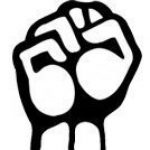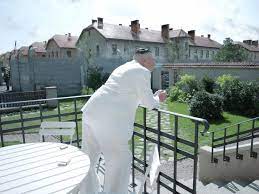Jonathan Glazer’s film The Zone of Interest, probably the most unsettling film I have seen (twice) in a very long time, ends with Auschwitz commander Rudolf Höss in an office party in Berlin, far away from his wife and five children with whom he had been living in a luxurious villa just outside the concentration camp walls, where they could just about avoid seeing the killing, but where there was plenty of aural and visual evidence of the mass murder, with the chimneys towering over their carefully tended garden. The party is thrown in honour of Höss’s new plan for a more efficient mass extermination operation. After boasting to his wife on the phone about the new plan, Höss wanders in the darkened building and is suddenly overcome by an urge to vomit. As he holds his stomach and stumbles on the floor, a vision of the future appears at the end of the dark hallway: a glimpse of Auschwitz today, a museum commemorating its Jewish and other victims (Dowd 2024). Vulture’s film critic A. A. Dowd wonders whether we should be reading this ending as Höss being finally confronted by his prominent role in the Nazi Final Solution and if he retched because his “sociopathic dissociation has faltered.” Or, alternatively, whether “Höss might be experiencing a different kind of rude awakening – not so much the belated emergence of a conscience as the realization of how small he is in the grand scheme of things.”
Another film, the documentary made by a Palestinian-Israeli collective including the Palestinian documentarist Basel Adra and the Israeli journalist Yuval Avraham, No Other Land, about the ongoing harassment of Palestinian sheep farmers in the South Hebron Hills area of Massafer Yatta, made me think about Dowd’s question regarding the end of The Zone of Interest. I watched No Other Land as the Gaza genocide continues. While a growing number of people, including Jewish people, act in solidarity with the Palestinians, others, “uninvolved” people I meet casually, are telling me that my adamant solidarity with Palestine is outside their zone of comfort.
I was born in Mandatory Palestine before the birth of the racial colony of israel and grew up in israel in a Zionist family and society before becoming aware of the Israeli colonisation of Palestine. I moved to Ireland where I had lived for 53 years and where I became increasingly involved in Palestine solidarity activism. I suppose that in today’s Ireland I would not have met so many people for whom solidarity with Palestine would be so uncomfortable. In some ways Irish society is exemplary in its solidarity with the colonised Palestinians, perhaps because of Ireland’s past as Britain’s first settler colony. However, even in Ireland, Jewish family members had been less than sympathetic. I spent my whole married life arguing with my late partner about Palestine and Palestine solidarity, had other family members tell me I was “wrong about absolutely everything to do with Israel,” and had some acquaintances say that “I had unresolved hate issues” regarding israel. Not to mention the profound discomfort of some of my israeli family members – my brother, a former israel air force pilot, has recently decided to cut our rather loose ties just because I mentioned the term “anti-Zionism.”

Despite the sterling solidarity work and mass rallies organised by the unmatched Ireland Palestine Solidarity Campaign, even Ireland is not ideal on Palestine. Ireland’s liberal daily The Irish Times, for instance, has published four or five articles about the alleged increase of antisemitism in Ireland since October 7 2023 as resulting, according to Ireland’s official Jewish community leaders, from Palestine solidarity activism. Like other official Jewish communities they are jumping on the anti-antisemitism bandwagon about which the Palestinian-German scholar Anna Esther Younes has written so eloquently.
I have often encountered the zone of (dis)comfort in my new abode, on Gadigal land, so-called australia – another settler colony – in relation to the current Gaza genocide. Two encounters in early June: a friend tells me how “uncomfortable” she feels when I express my distress about the Gaza genocide. Later, I get into a discussion about the Gaza genocide with a random man with whom I share the same space, whose response goes from the usual “it’s complicated” to mansplaining that Hamas and the Palestinians share the responsibility for the mass killing. Eventually, refusing to accept my apologies for making him uncomfortable, he leaves the space we share.
Though many people express sympathy, even admiration when I mention Palestine before moving to more neutral topics, I wonder how come I always end up apologising about other people’s discomfort when it comes to Palestine? Is it about israel doing such a good propaganda job, despite the live streamed genocide it keeps committing for us all to see?

As the genocide continues, complete with total destruction, hunger, homelessness, disease, the zone of discomfort continues. A survey of film and television producers in the UK reports “not knowing” how to talk about Gaza: “At work, producer Jasleen Sethi, a 2024 Bafta TV winner, wears a pin or a keffiyeh to demonstrate her support for Palestine. ‘I’m not subtle,’ she says. ‘I wanted to show my solidarity as it became clear what was happening in Gaza.’ There was plenty of conversation in her office when the war between Russia and Ukraine began in February 2022, ‘but there just seems to be silence when it comes to Palestine and Gaza… and silence feels like you’re being told not to talk about it – that’s why it becomes a little more intimidating.’”
Returning to Glazer’s film, I am astonished that so many israeli Jews, living a stone’s throw away from the bombarded Gaza Strip where the israeli military murdered nearly 40,000 people, two third of them children and women (though see Khatib et al. in The Lancet, who estimate the number of casualties at about 186,000), can so easily replicate the Höss family’s ability to unsee the horrific sights of murder and annihilation even as the sounds kept coming from across the wall. They can, of course, because the israeli media don’t show the destruction of Gaza, always use the escapist “I cannot bear to look at it” excuse. Too many israelis and their Zionist supporters insist that it isn’t really genocide as I argued in my earlier piece “Genocide is not a metaphor” and that Hamas operatives were the real genocidaires, repeating the debunked orchestrated rumours about beheaded and burnt israeli babies, and scores of raped Israeli women.
Take for example Haifa University professor emerita of History and daughter of the late liberal Zionist Israeli author Amos Oz, Fania Oz Salzberger, who posted this tweet (thanks Jonathan Ofir for alerting me to it): “Despite the horrible words thrown around by soul-dead politicians and traumatized youngsters, not a single Israeli soldiers entered Gaza with the commands, intent or wish to murder babies and rape women. Every single one of the 3,000 Gazans who entered Israel on 7/10 obeyed instructions, intended, wanted, and perpetrated just that. While my campaign for a Peace of the Moderates sometimes requires symmetrical language, there will never be a symmetry in the sheer joy of pre-planned massacre. Deradicalize both sides, by all means, but do not forget the difference.”
israeli and other Jews have of course also been invoking the Holocaust, comparing Hamas to the Nazis, and refusing to let go of what has become known as their, and theirs alone, “intergenerational trauma.” However, as Holocaust memory scholar Marianne Hirsch writes, it is especially important, after October 7, to remember that “The characterization of the Holocaust as the crime of all crimes—one that is always in danger of being displaced or denied—impedes, rather than clarifying, an understanding of other genocides, and of the genocidal character of the war in Gaza.” The postmemory of the Holocaust can be useful at this moment, she adds, “but that is true only if those of us who have a stake in it refute, in Jonathan Glazer’s terms, the inevitability of continued victimization, and refuse to allow our histories to be used as an alibi for war and destruction.”
In Glazer’s film Rudolf Höss’s mother-in-law, who comes to visit her daughter, cannot stand the thought that perhaps among the incinerated Jews was also a Jewish woman whose house she used to clean. For her the chimneys and the faint sounds of the daily atrocities assumed a human face – the victims no longer the dehumanised subjects of Nazi racism. For her daughter, on the other hand, the Auschwitz villa is the opportunity she had always dreamt about. “After the war,” she insists cheerfully when Höss tells her he is being transferred, “we shall live like this again, in the country,” and she revels in the stolen Jewish fur coat that came, she is told, from “Canada,” not realising this was not a country.
I think of this as I watch young israeli soldiers gloat on social media about their looted spoils – watches, expensive foods (before famine set in), cash, women’s sexy underwear (as if colonised subjects cannot have enjoyable sex lives). Höss’s wife got her luxuries from “Canada,” and the IDF boys and girls taking selfies against the smoking ruins of Khan Yunis or Rafah, shout at their critics, “go to Gaza” – the israeli synonym for “go to hell…”
And all the while we are surrounded not only by the Oz Salzbergers of this world (and I am particularly perturbed as Salzberger is my maiden name – family is no guarantee of consent as I already said). We are also drowning in the sea of discomfort of those who cannot bear our deep commitment – as Jewish people in my and my Jewish comrades’ case – to the decolonisation of Palestine, to the dismantling of the Zionist entity, and to freedom. Outside the admittedly loud islands of solidarity we are drowning in the zone of discomfort, in the oceans of denial, which, as Stanley Cohen argued, is a paradox, as we deny only what we actually know.
And as the discomfort turns into fatigue and indifference, the racial colony continues its lebensraum plans to re-settle Gaza, and now also Southern Lebanon with Jews. And the debates shift from whether it is a textbook case of genocide to vigorous discussions about the Palestinians’ right – duty – to resist. As Abdaljawad Omar said shortly after 7 October: “To me the Palestinian struggle exposes truths, reveals fascisms, and emboldens trajectories of change, radical political, and economic change in these societies – or at least it should do so. Palestine is not a nationalist, nor a religious, nor a feel-good cause… Our gift to the world [was] given through our blood, especially for those interested in a more just, more economically equal, decolonial, deracialized world. The struggle we lead reveals hidden discourses of imperialisms and forces centres of power to reveal their schizophrenic stances and hypocritical posturing. This is why Palestine is a universal struggle, a place for the condensation of truth in a post-truth historical conjecture. It is also a place from which the imperial metropole, and those within it suffering from racialized inequalities, can see in Palestine and its struggle a natural and political affinity.”
In conclusion I return to Dowd’s question about whether Höss’s stomach pains derive from pangs of conscience or from realisation of his relative marginality in the history of race, coloniality and genocide, and speculate whether the discomfort of those not prepared to see Gaza, believe the genocide, or who insist on continuing the colonisation of Palestine once the Gaza dust settles and the costly reconstruction enriches the capitalists – can continue to prevail in Omar’s envisaged world, a world of racial, political, and economic change.


You must be logged in to post a comment.